Causes:
The Stamp Act

The Stamp Act was introduced to tax the Americans because England was in serious debt after the ending of the Seven Years War. It was created so that you could prove you payed the taxes by buying the stamp and applying it on items like documents. Colonists were angered by being directly taxed by the British because they felt they were being taxed without their consent and was taxation without representation. They also did not feel the need for British soldiers in the Thirteen Colonies. However, it was necessary because this was how they would fund the army and to protect the Americans. Eventually, a group of colonists called The Sons of Liberty would punish tax collectors by tarring and feathering them. They did this to show the British government that they will continue to harass the collectors unless they remove this tax.
The Townshend Act
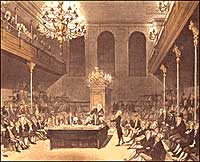
The British imposed new taxes called The Townshend Acts to tax Americans when recieving imported goods like paper, paint, glass, and tea. The British did this to prove its authority over the Colonists. The British had the authority to tax the Americans but the Colonist believed it was violating their rights granted by The Magna Carta and The Bill of Rights. The Americans once again protested and the taxes were removed except from the tea. The British left the taxes on the tea in order to protect the British East India Company. British troops were also stationed throughout the colonies because of the increased resistance.
Boston Massacre
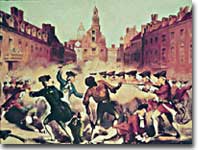
In 1770, nervous British soldiers misunderstood orders and shot Boston protesters killing several people. The American colonists were protesting and provoked the British soldiers when they threw rocks and snowballs at them. It was simply a misfire by the British and was unintentional. The Boston Massacre was used as propaganda by Paul Revere against the British. The Townshend Acts were repealed except the tax on tea which the colonists where angered.
Tea Act and Boston Tea Party
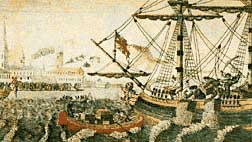
In 1773, many Protestants dressed as Mohawks and boarded British ships docked in the Boston harbor. They destroyed a fortune in tea by throwing it into harbor. This event, known as The Boston Tea Party was to protest the Tea Act and became one of the most symbolic events leading up to the American Revolution.
Intolerable Acts
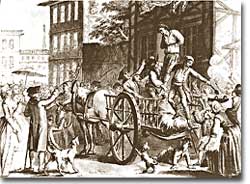
The British imposed the Intolerable Acts as a response to the Boston Tea Party. The British requested that the colonists payed for the destroyed tea (and they did not) so instead they imposed the Intolerable Acts. Many of the American Colonies viewed these acts as a violation of their natural and constitutional rights. They were, The Boston Port Act, which established to close the Boston port until the East India Company is compensated for the destroyed tea, The Massachusetts Government Act, which was made so all the Colony’s government was appointed by the British, The Quartering Act, which was to give home to any unaccompanied house, and lastly The Administration of Justice Act, which allowed British officials convicted of crimes to have trial in another colony or even Great Britain. The colonists believed that the British’s response to the Boston tea party was too extreme, harsh and unfair.
First Continental Congress
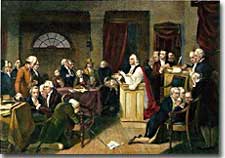
The Americans were fed up with The Intolerable Acts. There was agreement that warranted an inter-colonial meeting. In September 1774, The Thirteen Colonies except Georgia sent Delegates to the First Continental Congress taken place in Philadelphia. During the Congress, the American leaders demanded a boycott of goods and began to cut off ties from England . They later began to train and to store weapons and ammunition as a result of the British sending troops to Boston.
Components:
Battle of Lexington and Concord: 1775
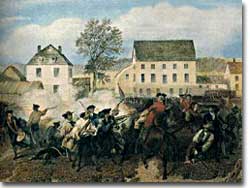
King George sent General Thomas Gage to the Thirteen Colonies to disarm and arrest the Colonial leaders. General Gage sent 700 men to seize and destroy the American’s artillery and ammunition. The colonist were warned by Paul Revere and William Dawes and were prepared with 70 minutemen. When the British arrived, an unknown shot was fired known as the shot heard around the world. The redcoats unleashed devastating volleys before charging the minutemen. The Militia retreated to a ridge north of concord and held of the redcoats forcing them to retreat. Hundreds to thousands of farmers fired at the British soldiers while they were retreating and it was the official beginning of the revolutionary war.
Battle of Bunker hill: 1775

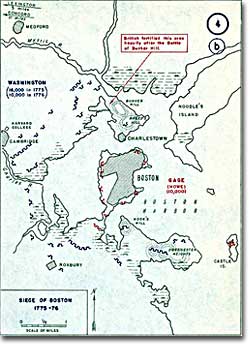
On the night of June 16, 1775, a group of American troops moved out towards Bunker Hill to build a wall of dirt. From this hill, the rebels could bombard the town and British ships in Boston Harbor. The next morning, The Americans were threatening the British because they had such an advantageous position. Major General William Howe, leading the British forces decided to march his troops uphill. The Americans waited until the British were within 15 paces, and then fired at the British. The British were wounded and many retreated down the hill. Again, the British rushed the hill in a second wave and once again they retreated, suffering a great number of casualties. By the time the third wave of British charged the hill, the Americans were running low on ammunition. The British finally defeated the Americans but at a great cost.
Thomas Paine’s Common sense: 1776
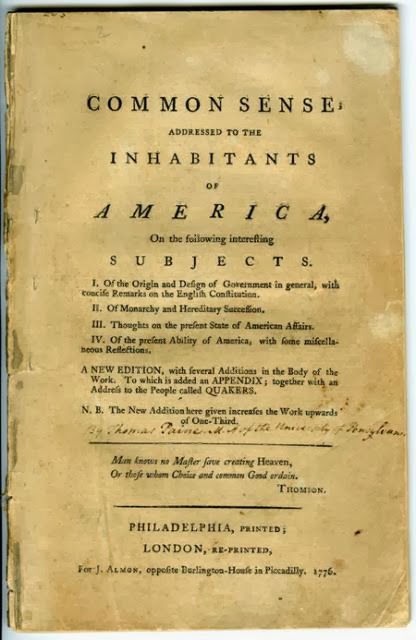
During the war, the Americans began to want independence from England. Thomas Paine published a book called Common Sense in 1776 and he argued the independence of England and the creation of a democratic republic. In Common Sense, he often quoted the Bible in his novel which appealed to most people because they were religious. The book grew to the Patriot cause even though Paine was new to the Thirteen Colonies. However, he was very biased in it and only told the argument in the Americans perspective unless bringing up an English point only to shut it down soon after.
Declaration of Independence: 1776

The Colonial leaders during the war discussed what they were fighting for and ended up deciding they wanted independence from England. The Declaration was a formal legal document that led the thirteen colonies to separate from the British Empire. Much of the Declaration was a list of abuses that were blamed on King George III.
Battle of Trenton:1776


The Americans had been suffering tremendous casualties resulting in low morale. George Washington planned an attack on the Hessians during Christmas to surprise them because they would not expect an attack and would probably be drinking during this time. When the Americans stormed New Jersey all escape routes were cut off. Artillery was set up in two advantageous positions causing tremendous damage to the Hessian ranks. The Hessians were overrun, surrounded, and forced to surrender. This battle was a huge moral boost for the Americans.
Battle of Saratoga: 1777


The British planned to cut off New England from the rest of the colonies by taking New York, Albany and the Hudson River. Generals Burgoyne, St. Leger and Howe would meet at Albany to defeat the Americans. However, Burgoyne’s army was trapped in Saratoga by General Gates. October 7, 1777 Burgoyne attempted to attack the larger Patriot force. Burgoyne’s army was defeated and due to a lack of supplies and high casualties Burgoyne surrendered. The Patriot victory at Saratoga was a turning point in the war. It renewed the morale of the American. It also convinced France the Americans could win the war and decided to support the Americans. The French sent generals, troops, ships, supplies, money to help Americans win the war.
Battle of Camden: 1780

Gates outfitted his army near Charlotte and ordered the American soldiers and militia to march toward British lines. Half of his soldiers were ravaged by disease or exhaustion and the British troops inflicted heavy casualties to the Patriot right flank. The Patriots who lacked bayonets immediately fled. Soon Gates, along with certain portions of his army fled the battleground. Over a thousand Patriots were captured and 900 were dead or injured.
Battle of Cowpens: 1781

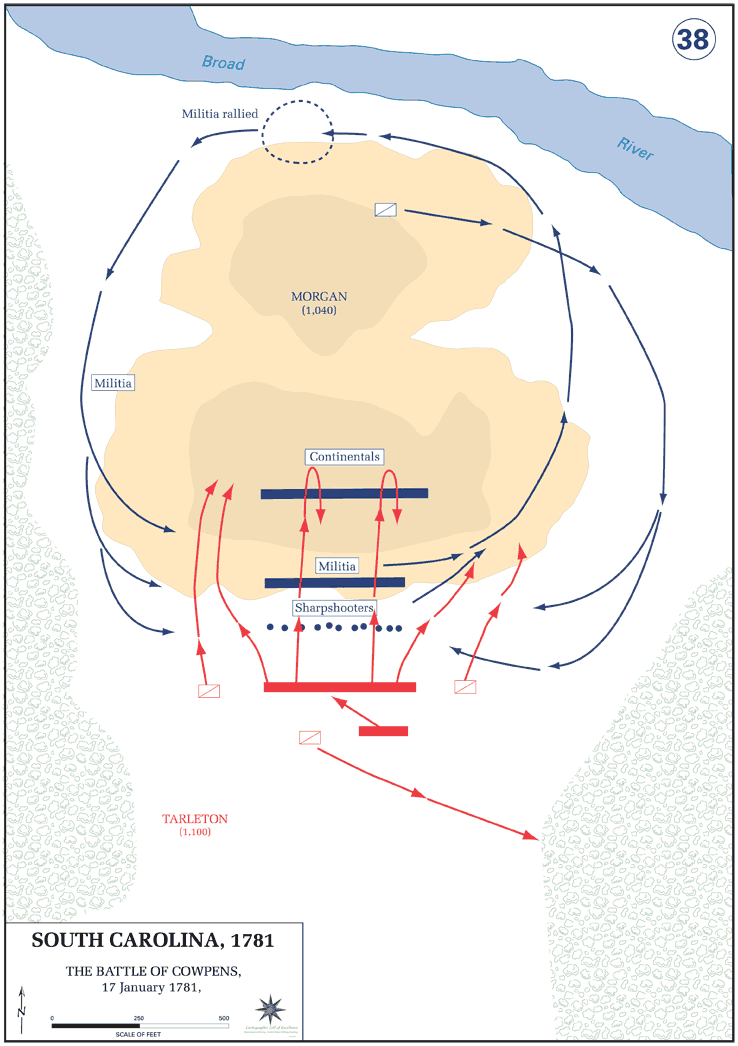
After the initial British charge, the first two lines of Patriot fighters withdrew. Tarelton believed the Patriots were in full retreat and ordered soldiers to charge. Tarelton was not aware of a third line of Patriot fighters waiting for them and British forces charged directly into the third line of Americans who stopped British advance with a bayonet charge. Many British soldiers surrendered and others turn and fled the battle. The remaining British army was outflanked and Patriot forces began attacking the British from behind. British forces began to retreat, despite Tarelton urging them to continue fighting and Morgan captured 712 and killed 110 British soldiers. This battle was the turning point for the Southern Campaign.
Battle of Guildford Courthouse: 1781

Out of complete frustration resulted from the Battle of Cowpens, Charles Cornwallis resolved to destroy the southern branch of the American army. He decided to launch the attack despite having less than half of the oppositions men. The British were forced into a disorganized retreat but Cornwallis decided to fire heavy guns and cannons over his own soldiers which proved successful. He defeated the Americans but suffered a lot of casualties.
Battle of Yorktown: 1781


French forces had fully committed in the American effort to defeat the British. The French and Americans trapped Cornwallis’s army from both the west and east sides. The Americans dug trenches to allow the movement of artillery. The French and the Americans sprayed bullets into the British defenses resulting in some of the British to desert. Cornwallis later surrendered and the Americans took more than 7000 British prisoner. It was the last major battle of the revolutionary war.
Consequences:
Treaty of Paris
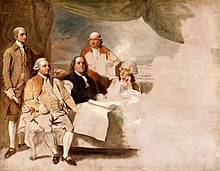
Britain agreed to recognize American independence. They gave Americans fishing rights to the Grand Banks off the coast of Newfoundland. Britain also granted The United States all territory between Allegheny Mountains on the east and Mississippi River on the west.
Loyalist

Approximately 20% American colonists supported British rule and remained loyal. The Loyalists were persecuted by the Patriots during the war. The Patriots abused them and burned their homes and farms because they believed that the loyalists were traitors and a threat to the revolution. After the revolution and the Treaty of Paris was signed, and between 80,000-100,000 Loyalists had to leave The United States. They moved and settled in other British colonies in North America such as Quebec, Nova Scotia, and Prince Edward Island.
Constitution

The Constitution outlines the structure and powers of government. There were three branches of government (executive, legislative, judicial) and are separate from one another, checked, and balanced off by the power of the other two. The constitution states, all persons are equal before the law and people can change the constitution if desired.
Bill of rights
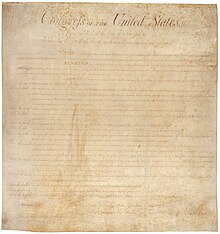
The Bill of Rights is one of the most important documents in the world.
The Bill of Rights is the first ten amendments of the constitution and represents ideals regarding individual liberty, limited government, and the rule of law.
Worldwide Influence

The American Revolution spread ideas of liberty, individual rights and equality to other parts of the world. It influenced and inspired other revolutions around the world such as France in 1789. The Declaration of Independence had some impact on the French Declaration of the Rights of Man and the Citizen of 1789.